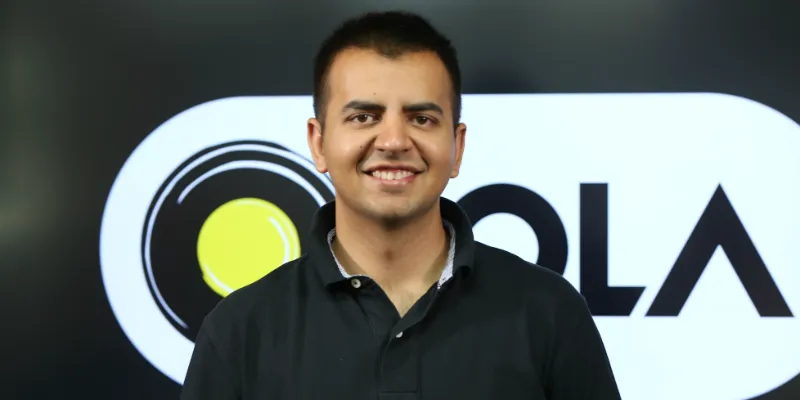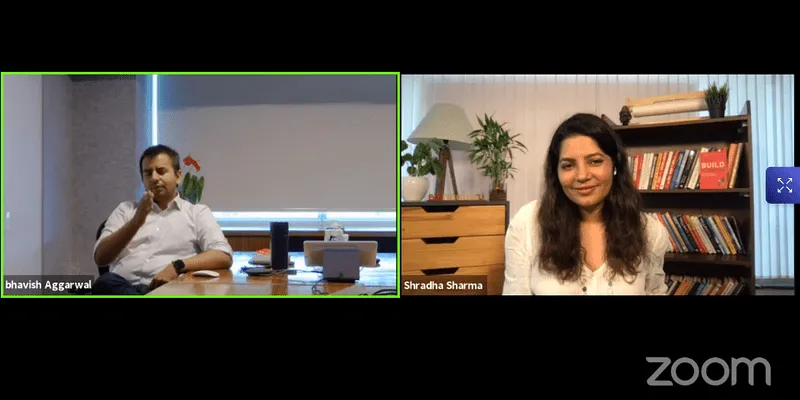[TechSparks 2020] We want to build a world-class company that is profitable and sustainable, says Ola's Bhavish Aggarwal
At TechSparks 2020, Bhavish Aggarwal, Co-founder and CEO, Ola, spoke about the plan for the next ten years for the ride-hailing unicorn, and his take on the future of mobility.

Bhavish Aggarwal, Co-founder and CEO, Ola Group
Bhavish Aggarwal, the media-shy poster boy of the Indian startup ecosystem, is unapologetically ambitious. The co-founder and CEO of ride-hailing unicorn has already put India on the global mobility map, and is now aiming for more.
“We want to build a world-class company that is profitable and sustainable,” Bhavish said during a fireside chat with Founder and CEO Shradha Sharma at TechSparks 2020.
At the 11th edition of TechSparks, which went virtual this year due to the pandemic, Bhavish shared Ola’s story board, its plans for the next decade, and the trends that will define the future of mobility.
1000x growth in four years
Over the last 10 years, Ola has not just evolved to become one of the largest mobility companies in India, but has also given its global rival companies a run for their money. It has expanded its footprint globally, and is now offering services in New Zealand, the UK, and Australia.
Talking about Ola’s plans for the future, Bhavish said, “Our ambition is to play across the value chain of mobility...and we are building with a 10-plus year vision.”
He explained further that the most important step towards realising this vision was to get into the electric vehicle (EV) segment. The Bengaluru-based unicorn launched in 2018 with the vision to bring one million EVs on Indian roads by 2021. Ola’s electric mobility wing, which is also a unicorn, further accelerated the vision by acquiring Amsterdam-based Etergo BV earlier this year.

Bhavish Aggarwal of Ola in a conversation with YourStory's Shradha Sharma during TechSparks 2020
“It was a challenge for us because manufacturing and automobile design is very different from software...but our approach is to catch the technology disruptions at inflection points,” Bhavish said.
Tracing the journey of Ola, Bhavish recalled and said he started Ola at the age of 24, right after college. While the first couple of years were spent figuring out the business model, Ola’s growth happened within a short span of time.
“We started off very organically...between 2014 and 2018, we grew, maybe 1,000 times, because of the adoption of technology. Maybe the same will happen with electric (EV),” Bhavish said.
He further added that in the next five years, the lighter vehicle formats -- two-wheelers and small four-wheeler vehicles -- will all get electrified. “We want to accelerate that adoption curve and make the most of that opportunity,” Bhavish said.
Future of mobility
Ola has been leading the way in the mobility segment by bringing the latest technology. When Shradha asked Bhavish what are the few trends that will define the future of mobility, Bhavish was clear about the opportunities that Ola is betting on.
First, he talked about servicification of mobility -- people wanting to use something versus buying something. “That’s a trend that Ola rode globally and the whole ride-sharing industry was built around this trend,” he said. Bhavish believes it will continue to be a strong trend in the future.
However, Bhavish said people will definitely want high quality mobility services unlike in the past when getting around meant either taking a public transport or getting one’s own vehicle. While this trend is already 10 years under development, Bhavish’s take was that it will take another 10 to 20 years to really flourish around the world.

Bhavish Aggarwal during a conversation with Shradha Sharma during TechSparks 2020
Secondly, transformation of energy technology will define the future of mobility. “EVs and lithium-ion batteries are one part of that, and fuel cells and hydrogen will become more relevant in different parts of the mobility segments,” Bhavish added.
While it’s a global trend, the right kind of infrastructure will have to be built around it and the construction of the new industry will take another 20 to 30 years. “But it’s much earlier than its inflection, and we (Ola) want to play a leading role in that,” he revealed.
Additionally, Bhavish also mentioned about Ola's ambition to get Indians and individuals across the globe to get electric vehicles. In fact, Ola is trying to harness the potential of solar energy to charge batteries and make EVs 'accessible and absolutely clean'.
Third is the concept of mobility or vehicle is changing. “The whole notion of a vehicle is becoming more modern with digital technology. It is becoming a vehicle which knows you, is a smart vehicle, is your companion, keeps you much safer than before, and is more efficient and cleaner,” Bhavish said.
Finally, the fourth disruption in the mobility segment would be in the way individuals buy mobility products. “To buy a mobility product, we go to dealerships today. That is completely going to change,” he said. He feels that the business model of dealership and distribution of mobility will change and it will be a global trend.
“These trends will change how we consume, own, and buy mobility. The whole paradigm is going to change. It is once in a generation transformation of one of the largest industries in the world,” Bhavish said. “And we (Ola) are at the right place, at the right time,” he added.
With technologies and business models converging, the transformation of the mobility industry will be a global phenomenon, making it much more sustainable. Ola believes it is well positioned to build this future.
“We will create for India, and from India. A company which builds for India, can build for the world,” Bhavish said.
For more information on TechSparks 2020, check out our TechSparks 2020 website. Sign up here to join the event.
TechSparks - YourStory's annual flagship event - has been India's largest and most important technology, innovation, and entrepreneurship summit for over a decade, bringing together entrepreneurs, policymakers, technologists, investors, mentors, and business leaders for stories, conversations, collaborations, and connections that matter. As TechSparks 2020 goes all virtual and global in its 11th edition, we want to thank you for the tremendous support we've received from all of you throughout our journey and give a huge shoutout to our sponsors of TechSparks 2020.
Edited by Megha Reddy


![[TechSparks 2020] We want to build a world-class company that is profitable and sustainable, says Ola's Bhavish Aggarwal](https://images.yourstory.com/cs/2/3fb20ae02dc911e9af58c17e6cc3d915/Imageopu1-1604044086558.jpg?mode=crop&crop=faces&ar=2%3A1&format=auto&w=1920&q=75)
![[TechSparks 2020] If we can build for our community, we can build for the world, says Ola’s Bhavish Aggarwal](https://images.yourstory.com/cs/2/604090802d6d11e9aa979329348d4c3e/Imagez65i-1602505193183.jpg?fm=png&auto=format&h=100&w=100&crop=entropy&fit=crop)
![[TechSparks 2020] OTT, cinema theatres will coexist in a post-COVID world, says BookMyShow’s Ashish Hemrajani](https://images.yourstory.com/cs/2/3fb20ae02dc911e9af58c17e6cc3d915/Image1vy5-1603949727105.jpg?fm=png&auto=format&h=100&w=100&crop=entropy&fit=crop)





